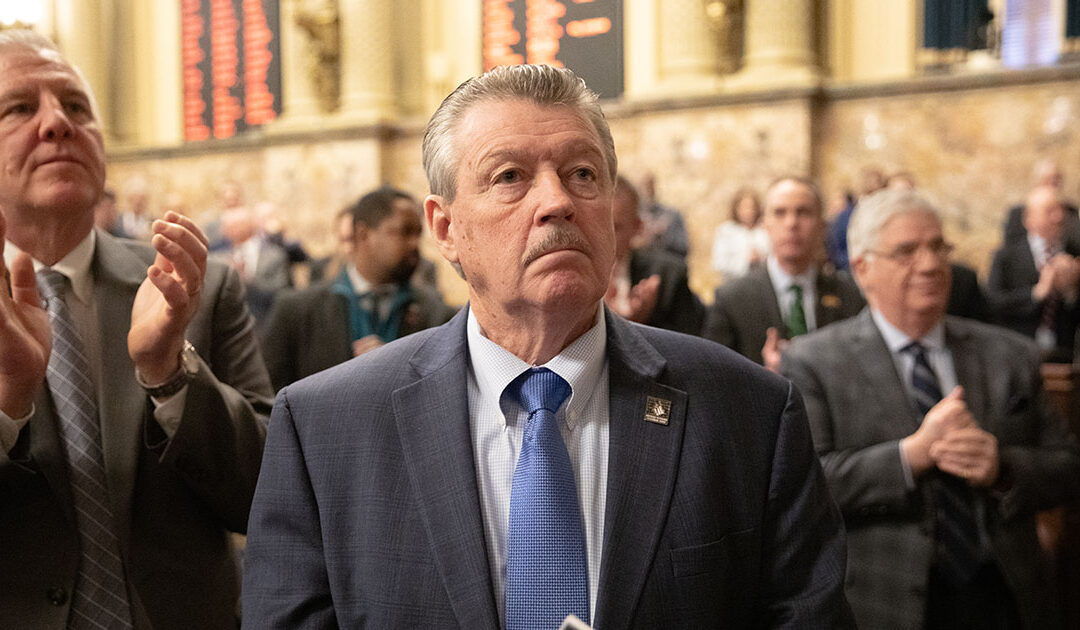
March 7, 2023
State Sen. Jim Brewster issued the following statement today on Gov. Shapiro’s inaugural budget address:
The governor’s budget provides a solid framework for building upon recent improvements to education, public safety, and the environment. I’m looking forward to working with the administration to fill out the framework with the details that will help communities thrive and keep our neighbors safe and healthy.
Pennsylvania’s economy has provided revenue that will in turn provide opportunity to address long-term and systemic neglect of our public education system, a system that has been declared unconstitutional in its inequity.
At the same time, I applaud the governor for outlining a way to change the way we fund the State Police to create sustainable long-term investments in public safety through the expansion and continued improvements to training and equipping our troopers.
From improvements to childcare to expansion of the Property Tax and Rent Rebate Program, the budget should lift Pennsylvanians of all ages in all regions. It is a thoughtful and balanced approach to governing and I’m looking forward to filling in the details over the next several months. For more details on the budget visit pasenate.com/budget.
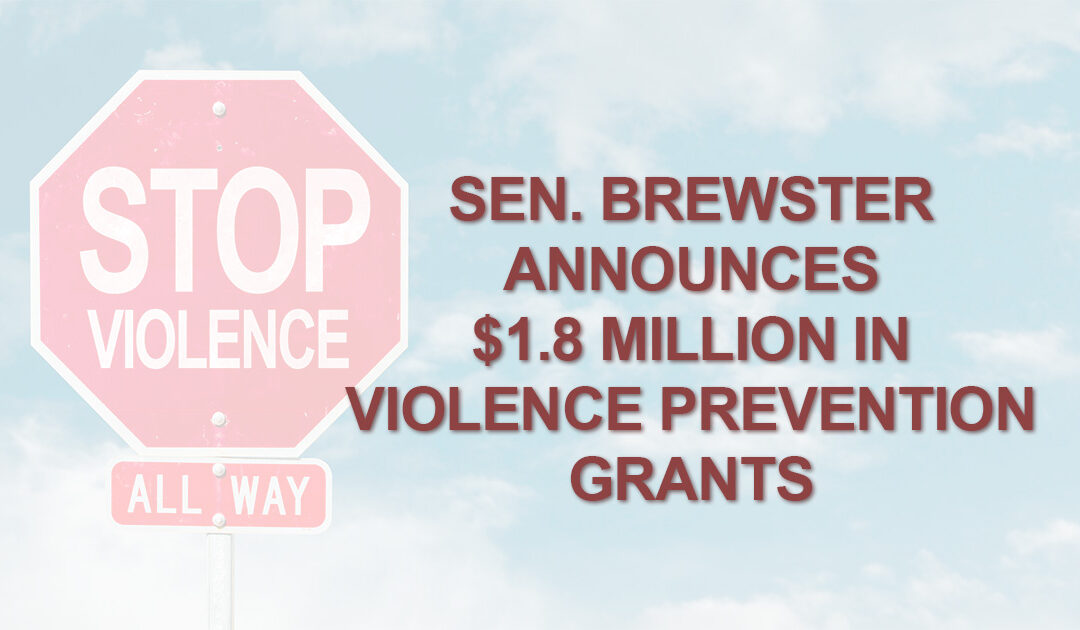
December 15, 2022
Harrisburg – December 15, 2022 – Police departments in the 45th Senate District will receive more than $1.8 million in state funds to for equipment and training, state Sen. Jim Brewster announced today.
“We’re still facing and epidemic of violence that surged during the early days of the pandemic and hasn’t really let up,” Brewster said. “These grants will help provide equipment and training to help local police face new and lingering challenges.”
The grants were awarded through the Pennsylvania Commission on Crime and Delinquency (PCCD) and approved at their meeting on Wednesday. Brewster serves on the Commission’s School Safety and Security Committee.
Local governments receiving grants include:
- Baldwin Borough – $200,000 for Medical Marijuana Enforcement
- Plum Borough – $200,000, for Medical Marijuana Enforcement Training
- Duquesne City – $739,479, for surveillance cameras, license plate readers, and IT upgrades as well as $645,150 to staff and support a gun violence investigation unit
- West Mifflin Borough – $90,240 for in-car cameras
The grants were part of $170 million awarded statewide through the Local Law Enforcement Support (LLES) Program and Gun Violence Investigation & Prosecution (GIVIP) Program. Both are administered by PCCD. Brewster helped secure funding for these programs in the most recent state budget.
The LLES program provides law enforcement agencies with the necessary resources to implement information technology improvements, purchase or upgrade equipment, cover nontraditional law enforcement personnel costs, support retention and recruitment efforts, and provide necessary training. Priority consideration for these grants is given to areas of Pennsylvania with high rates of violence or to law enforcement agencies with low clearance rates (i.e., lower ability to solve crimes).
More funding will be made available next year. Interested groups can visit the PCCD website for information.

November 16, 2022
Harrisburg – November 16, 2022 – Community improvement projects in the 45th Senate District have been awarded $625,000 in state grants funded through an assessment on gaming revenue, Sen. Jim Brewster announced today.
“We have many community leaders in my district dedicating themselves to improving the quality of life for their neighbors,” Brewster said. “I am proud to support their efforts to attract funding for their carefully planned and sorely needed projects. These investments will pay off in the years to come.”
The funds were awarded by the Commonwealth Financing Agency through the Gaming Economic Development and Tourism Fund (GEDTF).
GEDTF grants allow awardees to carry out community focused economic development projects. Eligible applicants include municipalities, authorities, councils of government, non-profit organizations, trusts, and for-profit businesses.
Projects in the 45th District approved for funding are:
Glassport – $50,000 for Juniata and Scenic Street repaving. The project will include 1,735 linear feet of asphalt, from the intersection of Juniata Street and Pacific Avenue to dead end, and the from the intersection of Scenic Street and Washington Blvd. to the end.
McKeesport – $100,000 for renovations to Stephen Barry Field including improvements to lighting, drainage, re-contouring, bleacher upgrades, and storage.
Monroeville Baseball and Softball Association – $100,000 to improve the infrastructure at Monroeville Community Park West Baseball and Softball complex, including replacing field turf, lighting fixtures and safety netting, as well as installing scoreboards and batting cages to be used by all that rent the facilities to make Monroeville the premier destination to host tournaments, parties, and community activities.
Pitcairn – $50,000 to demolish 121 Wall Avenue & 400 2nd Street. The work will include asbestos surveys and removal asbestos if necessary. The project will include backfill of basements and foundation areas and restoration of site to include grading, import of topsoil & mulching.
Port Vue – $50,000 for street resurfacing.
Turtle Creek – $50,000 for renovations, including new play equipment at 7th St and Larimer Avenue playgrounds.
Wall – $50,000 for asbestos abatement, demolition and clearance of 14 structures in the borough.
West Mifflin Sanitary Sewer Municipal Authority – $50,000 for the Mid City Pump Station Forcemain replacement with more than 500 feet of 8-inch PVC pipe.
White Oak – $75,000 to replace HVAC system at White Oak Athletic Association Gymnasium.
Wilmerding – $50,000 for reconstruction of 6,125 square yards of asphalt surface on three different streets.

October 27, 2022
McKeesport – October 26, 2022 – State Sen. Jim Brewster today announced more than $12 million in economic development grants for projects in the 45th Senate District.
“These state grant programs are extremely competitive and the great coordination between government and business in my district helped win significant investments in the region,” Brewster said. “Economic recovery is not done with miracles. It’s done through hard work, strong vision and consistent cooperation among state, local and business leaders.”
The money is being awarded through Pennsylvania’s Redevelopment Assistance Capitol Program, administered by the Office of the Budget for the acquisition and construction of regional economic, cultural, civic, recreational, and historical improvement projects.
Projects in the 45th Senate District include:
Braddock – Braddock Carnegie Library Association – $2 million – The BCLA’s overall renovation will create universal accessibility and year-round access to all three floors of the building while upgrading ADA accessibility. The primary focus of these funds will be to renovate and modernize the BCLA’s historic Music Hall. Renovation of the historic Music Hall and addition of amenities will allow the BCLA to host professional acts, performances & convenings.
Braddock – Braddock School Lofts – $500,000 – The project will focus on the adaptive reuse of the Braddock Junior High School. It will revive the historic façade and features of the structure while introducing community-based amenities and quality living space; repair the deteriorated elements of the building; and replace all broken or missing windows with high-performance replications. The existing building envelope’s historical integrity will be maintained, requiring an interior insulation approach. All building systems, including HVAC, plumbing, fire protection, and electrical, will be upgraded.
Brentwood – Economic Development – $1.5 million – In this project, Brentwood Borough will demolish its vacant former municipal building to the subgrade level. Asbestos and other hazardous materials will be professionally remediated. The site will be restored to pad-ready condition.
East Pittsburgh – Municipal Facility – $1,00,000 – This project will demolish the old gymnasium facility and construct the new municipal facility that would be centrally located to a majority of the residents. It will allow all borough services to locate in the same building, simplifying communications and overall operations. It would also move the public works department closer to the salt and construction storage area. The entire area will also be repaved and re-seeded, resulting in a net decrease of impermeable surfaces compared to the current condition.
Latterman Family Health Center – New Family Health Center and Magee OBGYN – $1.5 million – This project will construct a new family health center. It will expand operations and the number of exam rooms to provide ample space for patients as well as current, and future staff.
Lincoln – Rail Line for 2045 Lincoln Boulevard – $500,000 – This project includes the installation of a new mainline switch to the facility, the removal and reconstruction of existing track and the construction of new, additional track, as well as renovations to the rail scale improvements in site drainage to address frequent flooding at the rail scale location.
McKeesport – Executive Building – $1 million – The Executive Building is no longer condemned, and businesses are moving into its retail spaces. This project will help address the major mechanical concerns for long-term viability and stability. It will also allow a faster renovation timeline.
McKeesport – The People’s Building – $1 million – The People’s Building is no longer condemned and there are only a few small obstacles preventing occupancy for tenants. This project will address the major mechanical concerns for long term viability and stability. It will also speed up the renovation timeline which will allow developers to build out space for tenants faster.
River Materials – Transloading Expansion – $1,00,000 – With the aid of an RACP award, RMI plans to purchase the final piece of the site from RIDC and double its current dock capacity. Through this expansion RMI will have the area to fleet more than 65 barges. RMI is presently in negotiations to lease the five rail lines adjacent to their property to allow for expansion of the site to include rail to ground, river or trucks along with the loading of railcars with various commodities. RMI expects this will increase employment with the addition of 30 plus well-paying jobs in the Mon Valley region of Pittsburgh.
Monroeville – Jewish Community Center Family Park Facility – $2 million – This project includes renovations/improvements to four areas of JCC’s Monroeville Family Park facility: aquatics center renovations, including liner replacement and related filter/grating; renovation and addition of activity areas at the site, including the addition of much needed shaded play areas; construction of a new indoor building with classroom space; construction/renovation of kitchen and dining area to facilitate meal preparation and dining needs during the summer.
Wilmerding – Allegheny Petroleum Expansion – $1 million – The overall proposed project involves the purchase of the company’s existing leased building and renovations to improve the building’s structure and manufacturing capabilities. Manufacturing infrastructure includes new air compressors, compressor room, electric power redistribution, heat exchanger, nitrogen generations system, and six new processing tanks with piping.
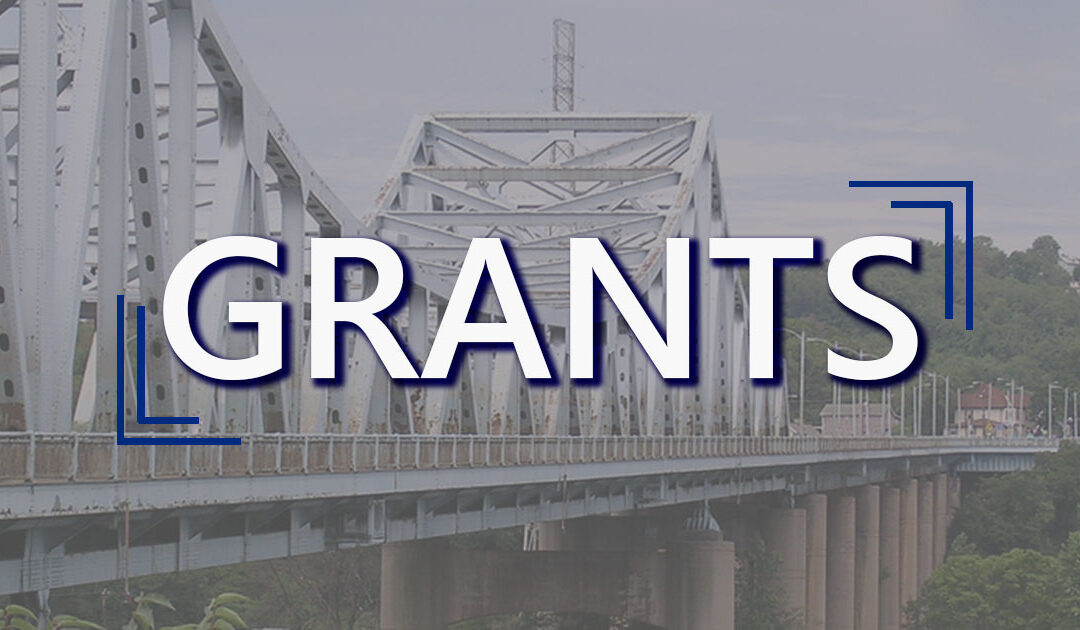
September 21, 2022
Allegheny County, September 21, 2022 – Today, Senator Jim Brewster and Representative Nick Pisciottano announced two grants for community projects in their legislative district.
The Borough of Dravosburg was awarded $120,000 to fund improvements to the U.S. Steel Ball Fields by the Commonwealth Financing Authority (CFA).
“I’m happy to see state funds coming back from Harrisburg to support deserving community projects,” said Senator Brewster. “Representative Pisciottano and I both recognize the importance of recreational projects like this to maintaining a good quality of living.”
The ballfields are frequented by many families in the region for games and other recreation. Funds will be used to support improvements to ensure the fields are in great shape for years to come.
“Youth sports play a fundamental role in our community,” said Representative Pisciottano. “I’m grateful for the hard work of Senator Jim Brewster to help secure these funds that will improve the baseball park and make it more accessible for the public.”
More information about CFA grants and programs are available online.
The Dravosburg Housing Association was also awarded a state grant for $166,000 to maintain the Housing Association complex in the Borough and install handicap ramps for more accessibility.
Pisciottano said this is an exciting time for community revitalization efforts in Dravosburg, highlighting the additional state grant of $166,000 awarded to the Dravosburg Housing Association earlier this year for local road and curb repair, funding that he played a major role in securing.
“These upgrades to the ballpark and roads are much needed and will directly improve the lives of local residents,” added Pisciottano. “These grants can be very competitive, and Senator Brewster and I fight hard to bring funds like these back to our area. I’m very proud to see our efforts help make our corner of Allegheny County a better place to live, work, and play.”
The Dravosburg Housing Association is a non-profit organization in the Borough offering affordable housing options and dedicated to community revitalization.

September 21, 2022
Harrisburg, September 21, 2022 – Today, State Senator Jim Brewster announced a Commonwealth Financing Authority (CFA) grant for the Yough Riverfront Trail Improvement project (Phase 3) in Versailles Borough. The project received $100,000 from the CFA’s Greenways, Trails, and Recreation Program (GTRP).
“These funds provide an important investment in the region,” said Sen. Brewster. “I’m happy to see state funds support spaces that can be enjoyed by all who live in and visit our communities.”
Additional CFA grants awarded in the 45th Senatorial District include:
- Borough of Pitcairn, The Joseph Markosek Sports Complex Improvements – $121, 931
- Clairton Industrial Center LLC, Clairton Redevelopment Well Plugging Project – $150,000
- Plum Borough, Plum Borough PRP Stormwater Improvements – $73,203
A park project planned for Castle Shannon Borough, a new area of Sen. Brewster’s district, was also awarded $125,000 from the CFA.
More information about CFA grants and programs are available online.

September 10, 2022
McKeesport – September 10, 2022 – Upon invitation by Swin Cash, Senator Jim Brewster traveled to the Basketball Hall of Fame to witness the enshrinement of the Class of 2022 and to present a Pennsylvania Senate Proclamation recognizing the McKeesport basketball star.
“Swin has been the pride of McKeesport for more than three decades and there’s still so much in her future,” said Brewster, former McKeesport Mayor. “Her accomplishments compare with anyone who has ever called the city home and, following her career as a player and sports executive, it was an honor to witness this chapter in the history.”
Brewster traveled to Springfield, Massachusetts, home of the Naismith Memorial Basketball Hall of Fame and birthplace of basketball, where he delivered a Pennsylvania Senate Proclamation to the all-star athlete honoring her achievements.
“It was a pleasure to ask the Senate for a Proclamation for McKeesport’s hometown hero,” Brewster said. “Over the years Swin Cash has come to represent excellence, and she means a lot not only to sports fans but to everyone who aspires to be great in any field.”
Cash, who starred at McKeesport High, went on to become an All-American and key contributor to legendary teams at the University of Connecticut, winning NCAA titles in 2000 and 2002. Selected second overall in the WNBA draft, she led the Detroit Shock to their first-ever title in her second season. In all, she won three WNBA Championships along with two Olympic gold medals. She is one of only 11 women to win Olympic gold, an NCAA Championship, a FIBA World Cup and a WNBA title.
After retiring, she became a broadcaster and basketball executive, now serving as vice-president for basketball operations for the New Orleans Pelicans.
“Everywhere she goes she sets goals, competes and achieves,” Brewster said. “She’s a role model for kids who want to succeed at anything, not just sports. She comes from a great family and those of us who watched her play through the years were not surprised that she has reached such heights in the world of basketball and beyond.”
The Class of 2022 enshrinement ceremony was held on Saturday, September 10.

September 7, 2022
Harrisburg, September 7, 2022 – Stewards of a popular and still-developing trail system in the Pittsburgh region will be receiving more than $200,000 as part of a historic state investment in conservation and recreation, state Sen. Jim Brewster announced today.
Friends of the Riverfront, the group that oversees development of the Three Rivers Heritage Trail system was awarded the grants by Pennsylvania’s Department of Conservation and Natural Resources (DCNR).
“One of the lessons learned during the pandemic was the critical importance of recreational trails to our health and well-being,” Brewster said. “As part of the recovery, Pennsylvania is making the largest one-time investment in recreation and conservation projects in its history, an investment that will pay off for generations to come.”
The 33-mile Three rivers Heritage Trail is a designated National Recreational Trail system that has segments on both banks of the Allegheny, Monongahela, and Ohio rivers that branches into Pittsburgh and local communities.
Friends of the Riverfront will receive a $114,000 grant to coordinate and fund training and technical assistance as well as to build organizational capacity to advance multi-use trail development on the Three Rivers Heritage Trail, Turtle Creek Connector, Pine Creek Connector and VOPP Trail in Allegheny County.
In addition, the group will receive $90,200 for rehabilitation and further development of Three Rivers Heritage Trail and Great Allegheny Passage in Baldwin Borough. Work will include construction of an observation deck, picnic shelter, and pedestrian walkway as well as making ADA-compliant improvements.
“I’m honored to have supported this important work and help direct part of this record funding to the region,” Brewster said. “I congratulate all the administrators and volunteers whose work made these grants possible.”
In all, Governor Wolf announced a historic investment of $90 million for more than 330 projects across Pennsylvania that will create new recreational opportunities, conserve natural resources, and help revitalize local communities. The investments surpass the previous record of $70 million awarded last year.

July 22, 2022
Harrisburg, July 21, 2022 – State Sen. Jim Brewster today praised the award of $268 million to Pennsylvania to be used to bolster struggling small businesses.
“One of my priorities has been the support and sustainment of small businesses and that mission became more critical and more difficult during the pandemic,” Brewster said. “The economy is recovering from the pandemic, but some entrepreneurs have found it more difficult than others. It’s good to know more help is on the way.”
The funds are part of the American Rescue Plan and will be administered through the State Small Business Credit Initiative (SSBCI), to spur small business success and job creation opportunities across the commonwealth.
The American Rescue Plan reauthorized and expanded the SSBCI, which was originally established by Congress in 2010 to provide loans and investments to underserved small businesses. As part of this reauthorization, $10 billion in funding is being allocated by SSBCI to states.
“This program will help businesses access capital in underserved communities that have met stiff barriers over the years,” Brewster said. “It’s a moral and economic imperative to make sure that hardworking people with good ideas are able to find the capital to make the dream happen. Everyone benefits.”
The Pennsylvania Department of Community and Economic Development (DCED) will distribute the new funds to eligible economic development partners who will then administer the funding to qualifying businesses in the form of equity investments and loans.
Pennsylvania will operate three different programs. The first two programs – equity capital investments and venture capital investments – have been allocated a combined total of $142 million. Direct equity investments will be made in seed and early-stage technology companies in Pennsylvania through longstanding partners Ben Franklin Technology Partners and Life Sciences Greenhouses, as well as venture capital investments in new funds under the management of underserved venture capital firms.
The third program is a loan participation program that has been allocated more than $125 million. It will extend loans of no more than 50 percent of total financing to small business borrowers through certified economic development organizations (CEDOs) and community development financial institutions (CDFIs).
Detailed guidelines will be available soon and eligible partners should visit the Pennsylvania SSBCI website for additional information as it becomes available. DCED expects to begin distributing the SSBCI funds to economic development partners this Fall.

July 21, 2022
McKeesport, July 21,2022 – State Sen. Jim Brewster’s efforts to protect Pennsylvania schools have paid off with a $200 million increase in funds for safety and security and mental health in the 2022-23 PA State Budget.
“This new School Code contains a historic financial commitment to school safety as well as focused regulation to make sure every school achieves baseline requirements,” Brewster said.
Since its 2018 creation, Brewster has been a member of Pennsylvania’s School Safety and Security Committee facilitated by the Pennsylvania Commission on Crime and Delinquency, and an advocate for hardening schools while at the same time addressing core causes by making mental health assessment more prevalent and counseling more available.
In 2019 Brewster sent a letter to the committee asking it to establish baseline standards of safety for every school in the Commonwealth. Specifically, he encouraged the committee members to establish physical baselines, including items such as door locks and cameras; mental health baselines, including school counselors and psychologists; and environmental baselines, including air quality monitors as well as lead and mold abatement.
The latest School Code changes the requirement for active shooter training from every 5 years to yearly training, an important piece of school safety.
“Everyone in the building should be trained on how to protect themselves in the event of an active shooter,” Brewster said. “This updated requirement in the School Code is a necessary improvement to keep our schools safe.”
After years of partnership and hard work by the School Safety and Security Committee, the PCCD, the General Assembly, and the Governor, the recently passed state budget contains historic new investments of $100 million for school safety infrastructure and another $100 million for school mental health grants.
The money, Brewster said, is only part of the progress. Pennsylvania’s School Code now requires the schools to conduct surveys to see if standards for mental health services are being evaluated and baselines are being met. This survey must be completed by August 31.
Just as important, the new School Code provides incentives for training new school mental health counselors through a School-Based Mental Health Internship Grant Program through the Pennsylvania Higher Education Assistance Agency (PHEAA). The program is intended to encourage careers as school counselors, nurses, psychologists, and social workers.
PHEAA will be required to keep track of grant applicants and awardees to assess the effort of bringing more mental health professionals to careers in schools.
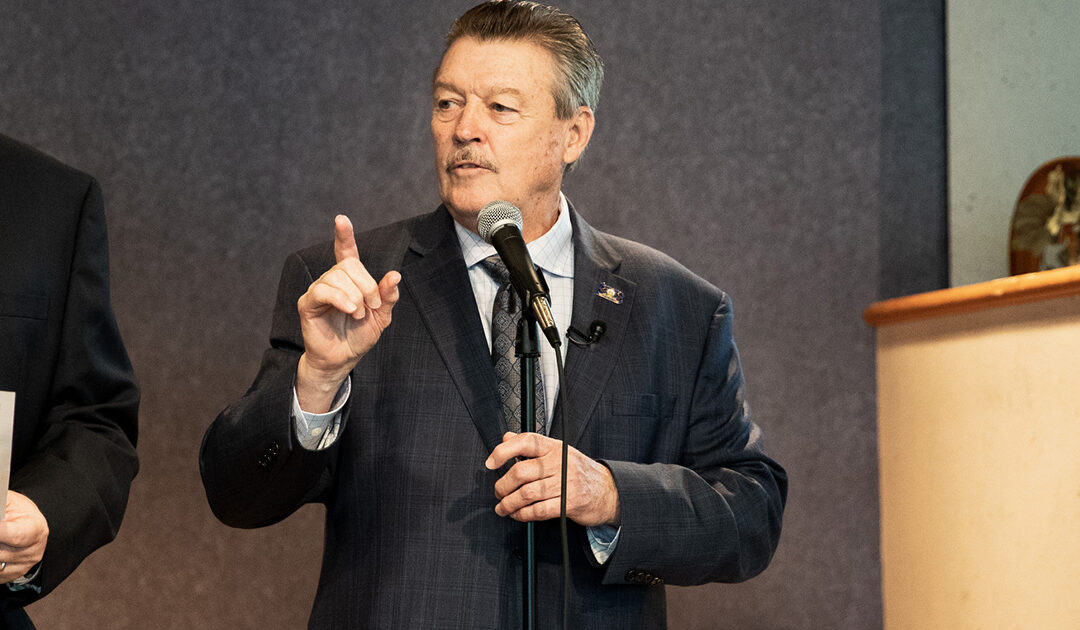
July 13, 2022
Harrisburg, July 13, 2022 – It’s not really surprising that the highly profitable Pennsylvania Liquor Control Board (PLCB) -which not only serves urban and suburban customers, but also reaches deep into sparse rural regions – has faced constant attacks over the years by profiteers and their loyal allies in the General Assembly.
What should be surprising is that these partners, stifled by the elected General Assembly’s refusal to put at risk up to 5,000 jobs and billions of dollars in state revenue, are now willing to try a new tack: an end run around the legislative process to push their scheme past voters in a low-turnout referendum that would lead to amendment of the state constitution.
It is the latest in a series of referenda proposed by a minority of lawmakers who can get their bad ideas through the General Assembly.
PLCB control of alcohol distribution keeps it away from minors, provides thousands of good paying jobs, ensures availability and selection in small, rural markets and delivers billions of dollars to the state treasury. Preserving quality jobs and protecting taxpayer revenue are issues that appeal to Democrats and Republicans alike.
In 2016, the parties agreed to a plan to modernize the PLCB. The reforms included removal of restrictions on Sunday sales, flexible pricing, private wine sales for hotels and grocery stores that sell beer, direct shipment of wine and six-pack sales at service stations. The negotiated deal brought together both long-time advocates and detractors of the system – uniting Republicans and Democrats in support of commonsense changes.
These efforts, along with other reforms, have made the system highly profitable and an integral part of the revenue platform for Pennsylvania. According to the PLCB, in Fiscal Year 2020-2021, the PLCB achieved record net profits of nearly $265 million, which was almost a 27 percent increase from the previous year. That profit, which comes on top of taxes raised, would be entirely lost in privatization, and would need to be made up somewhere, probably by raising taxes which I would oppose.
Not only was the PLCB lucrative, but it contributed more than $800 million to support state and local government operations. The PLCB sent $765 million to the General Fund, another $29 million was earmarked for the Pennsylvania State Police, $5 million for Drug and Alcohol programs plus millions in licensing fees went to local governments.
Conspicuously missing from this debate is any talk of the morning after. As is often the case with binge behavior, voters are likely to regret privatization when they wake up to higher taxes and prices, crowding of problem stores in dense neighborhoods, and dramatically reduced public health. Ask the people of Washington state, who voted to privatize in 2011. Thorough academic research concluded “…in the years immediately following liquor privatization in Washington State, public opinion has changed enough to shift the result of the election from supporting privatization to rejecting it.” Washington now has the highest liquor taxes in the nation to make up for the lost revenue.
The revamped and modernized PLCB is the product of bipartisan work. There is no need to clang the privatization bells and there is little to no clamor for fundamentally altering the system. The PLCB system is working. It’s protecting minors from alcohol, ensuring a wide array of products, extending service into rural areas and churning revenue to relieve taxpayers of an even greater burden.
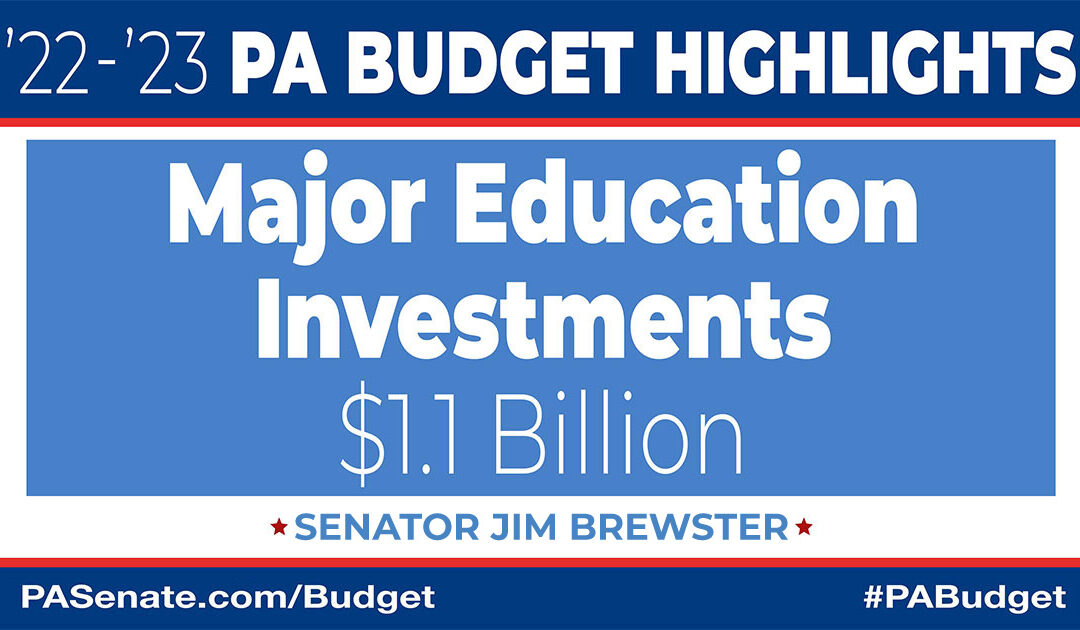
July 11, 2022
Harrisburg, July 11, 2022 – With a record state investment in violence prevention spending in the new budget, state Sen. Jim Brewster announced today that he has been re-appointed to the School Safety and Security Committee, the chief conduit for intervention programs in the state.
“We’re at a critical time for public safety after a surge in violence that accompanied the pandemic,” Brewster said. “The School Safety and Security Committee played a central role in reviewing and assessing intervention and prevention efforts and steering state funds where it can be most effective.”
The 17-member committee was created through Act 44 of 2018 with a goal to craft policies and provide grants to curb school and community violence. The committee works under the auspices of the Pennsylvania Commission on Crime and Delinquency (PCCD).
In July 2019 Senator Brewster sent a letter to the committee asking them to establish baseline standards of safety for every school in the Commonwealth to keep students, teachers, and administrators safe. Specifically, he asked for them to establish physical baselines, including items such as door locks and cameras; mental health baselines, including school counselors and psychologists; and environmental baselines, including air quality monitors and lead/mold abatement.
“During my time on the School Safety Committee, I have been advocating for establishing baseline criteria to ensure we are best utilizing money,” Brewster said. “I am thrilled to see that for the first time the funds will be prioritized to get all schools to baseline.”
Last year, the state committed a record $30 million to the school safety effort, and this year’s state budget more than triples that amount to $105 million with the help of America Rescue Plan funds.
“To reduce community violence, we need to address the core causes,” Brewster said. “Poverty, mental health, and addiction are serious drivers of crime in our communities, and this committee is investing additional funds to address these issues.”
In awarding grants last year, Brewster said the committee took a broad approach to what it perceived as a complex issue with a wide range of causes. The committee funded the efforts of large academic institutions that study the problem from a data-driven level, as well as small, grassroots efforts with budgets in the thousands and feet on the street.
As a senator, Brewster has been at the forefront on school safety issues. His appointment was made by Senate Democratic Leader Jay Costa.
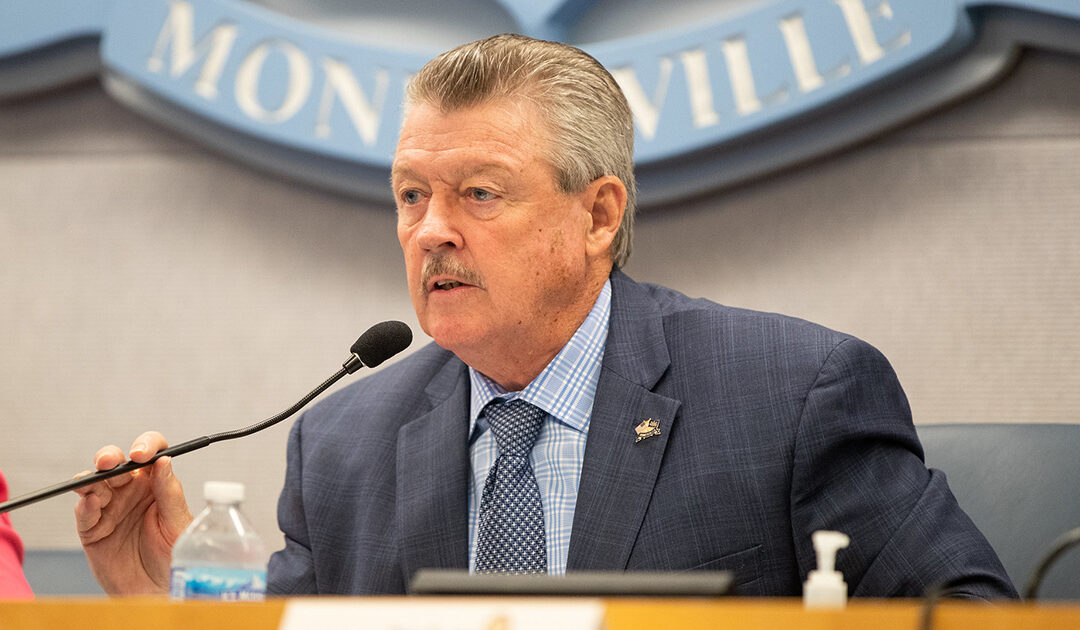
July 8, 2022
Harrisburg, PA − July 7, 2022 − State Sen. Jim Brewster, Democratic Chairman of the Senate Law and Justice Committee, released the following statement today regarding passage of the 2022-2023 state spending plan:
“This budget represents a significant act of sober and realistic governance at a time of unprecedented divisiveness and political acrimony in Harrisburg. I am grateful that, at the end of a process that was unnecessarily late and acrimonious, leaders prevailed in completing the process with an agreement that does not fulfill everyone’s wish list, but makes progress in areas where Pennsylvanians have demanded it.
“It continues years of improvement in funding education, including more money being passed through the Level Up program to help historically disadvantaged school districts in a state that currently ranks 47th in education equity.
“School districts in the 45th district will receive more than $7 million in new Level Up funding, as well as education increases across the board of more than 10 percent, which comes on top of years of continued progress on education funding.
“This budget utilizes more than $2.1 billion in American Rescue Plan funds that will be used in a variety of programs that support health and child-care workers, public safety and anti-violence initiatives, housing, infrastructure and higher education.
“As a member of the Pennsylvania Commission on Crime and Delinquency’s School Safety Committee, it’s important to acknowledge significant increases in programs aimed at curbing violence and ensuring safety in our schools.
“We were able to triple the amount of money available for grass-roots, street-level violence prevention from $30 million last year to more than $105 million this year. I look forward as a member of the committee to review the applications for these grants. On top of that, another $50 million will be invested in prosecution and investigation of violence.
“We’ll also be making dramatic increases in funding for mental health initiatives putting $100 million into behavioral health programs that can stem many of our societal problems before they ever result in crime or death.
“Even with these increased supports for our social safety net and education, we were able to cut corporate income taxes, putting us on a path to halve the Corporate Net Income tax in the coming years, making Pennsylvania more attractive in a competitive environment.
“It must be acknowledged that these critical investments were made possible by years of astute fiscal stewardship by legislative leaders and the Wolf administration which produced a historic $9 billion fund balance that allows these needs to be met while leaving billions in the Rainy Day Fund.
“This stewardship includes the staunch preservation of a billion-dollar revenue stream supplied by the state liquor store system, a system that has weathered constant attack by special interests while delivering for taxpayers.
“At the end of a difficult process we were able to negotiate, compromise and govern. Starting tomorrow we will continue our advocacy in the areas we fell short.”

July 7, 2022
Harrisburg, July 7, 2022 — A regional non-profit dedicated to growing and modernizing the local economy has been awarded a $2.25 million state loan to construct a new business center in Braddock, state Sen. Jim Brewster announced today.
The Regional Industrial Development Corporation of Southwestern PA (RIDC) will receive the low-interest loan through the Pennsylvania Industrial Development Authority (PIDA).
“It has been a top priority of mine to link local redevelopment efforts with resources available through the state,” Brewster said. “I’m proud of the work being done on the ground in my district to restore former industrial sites and provide the 21st century jobs that will stabilize communities and keep families in the region.”
RIDC was approved for a 15-year $2,250,000 loan at a 3.5 percent fixed interest rate to acquire land and construct a new building located on Carrie Furnace Boulevard in Braddock. The new multi-tenant building that will consist primarily of flex industrial space that could host robotics, visual effect areas, and other technology industries. It is anticipated that two tenants will occupy the space. The total project cost is $10,000,000.
“The competition for economic development funds is fierce and the partnerships we’ve built in this region are up to it,” Brewster said. “This is the hard work of many people paying off.
To date in 2022, PIDA has approved $23,366,119 in low-interest loans that have resulted in $49,812,138 in private investment and supported 743 created and retained full-time jobs. Since 2015, PIDA has approved $361,778,277 in low-interest loans that have resulted in $727,981,169 in private investment and supported 14,765 created and retained full-time jobs.
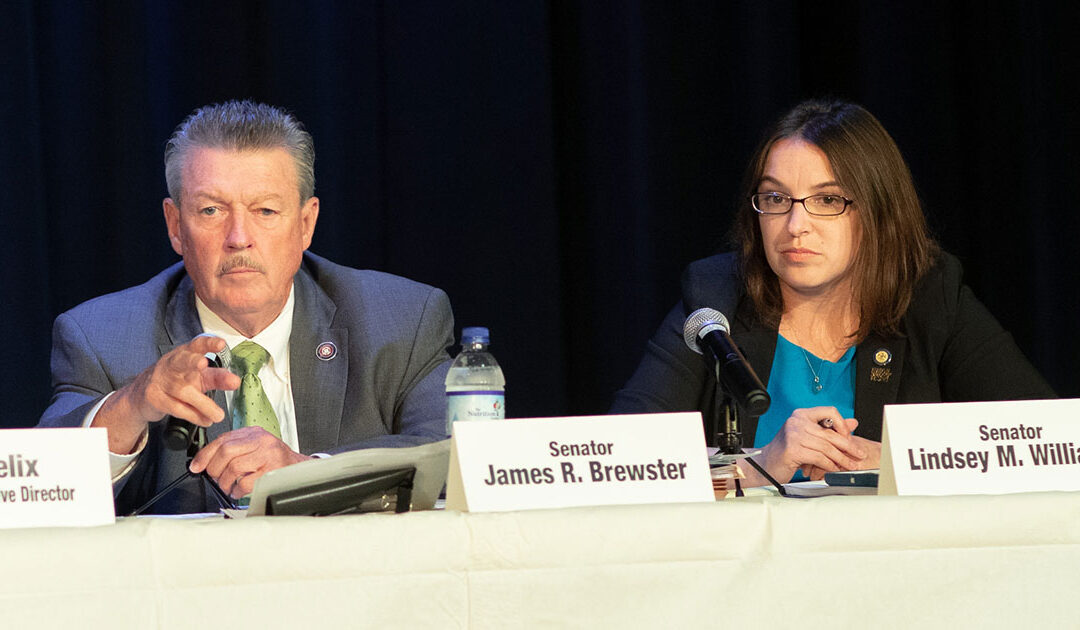
June 16, 2022
Harrisburg − June 15, 2022 − Senator Jim Brewster announced today that he is the prime co-sponsor of legislation aimed at improving student mental health. This bill seeks to put more school-based mental health care programs and professionals into classrooms.
Senator Brewster and Senator Williams are co-sponsoring SB 1285, which will focus the majority of grants awarded through the Pennsylvania Commission on Crime and Delinquency’s School Safety and Security program for the 2022-23 school year on funding applications for projects that support students’ behavioral and mental health.
“As a member of Pennsylvania’s School Safety and Security Committee, I have been a leading advocate for more resources for mental health services in our schools,” Brewster said. “This legislation will direct a majority of funding for 2022-2023 to school districts for additional mental and behavioral health programming.”
This legislation is modeled after a similar step that the General Assembly took in 2020, when it temporarily focused these grants on responding to the COVID-19 pandemic.
“Even before the pandemic, students have been telling us that there is a growing youth mental heath crisis,” said Senator Williams. “Safe2Say reports let us know that bullying, suicide, and self-harm are three of the biggest problems facing our students right now, and it’s time for the General Assembly to take action to address these. We’ve talked about how the pandemic has caused a mental health crisis in our students for over two years—it’s long past time we start taking action to fund the services that can provide immediate assistance to those students.”

June 14, 2022
Harrisburg, June 14, 2022 – The deadline to apply for a property tax or rent rebate has been extended to December 31st, State Senator Jim Brewster announced today.
The program is open for qualifying seniors or residents with disabilities. The previous deadline to apply was June 30.
“I am pleased by the Department of Revenue’s decision to extend the deadline to apply for property tax and rent relief,” Brewster said. “This is an important program to help seniors and those with disabilities manage their property tax bills.”
Brewster said by extending the deadline, there will be ample time for qualifying seniors or residents with disabilities to apply and receive financial help.
The senator said that his offices are open, and staff can help constituents file applications.
“I encourage eligible seniors who have not yet applied to receive their rebate to please do so as soon as possible,” Brewster said. “This program is a good way to channel funds back to those who need help.”
To be eligible for the Property Tax and Rent Rebate Program, a person must be 65-years of age or older, or, if a widow or widower 50-years of age or older, or be a Pennsylvanian with disabilities earning less than $35,000 per year for homeowners and $15,000 per year for renters. When calculating income, half of social security is excluded. The maximum rebate is $650 for most homeowners.
For more information about the program or to contact Brewster’s office about any other state-related matter, constituents can call 412-664-5200 or visit Property Tax/Rent Rebate Program (pa.gov) to apply online.

June 14, 2022
HARRISBURG, June 14, 2022 – Projects in the 45th Senate District aimed at expanding housing and preventing homelessness will get a $1.6 million boost from the state, Sen. Jim Brewster announced today.
“Safe and sufficient housing is becoming out of reach for too many in our region,” Brewster said. “These grants will help increase the stock of available and affordable living space for struggling families. I’m proud to work with so many good organizations dedicated to addressing this crisis.”
The funding comes through the Pennsylvania Housing Affordability and Rehabilitation Enhancement (PHARE) fund. Gov. Tom Wolf named 245 housing and community development initiatives in 67 counties that will share a portion of a total $48.4 million in PHARE funding for fiscal year 2021-22. The PHARE fund is managed by the Pennsylvania Housing Finance Agency.
“Too many seniors and young families are being priced out of the market,” Brewster said. “With this program, the money goes where it is needed most and helps our neighbors remain our neighbors.”
A list of the proposals receiving PHARE funding is available at www.phfa.org/legislation/act105.aspx
Funding for 45th district projects was awarded to:
712 Hawkins Avenue, Za’kiyah House Housing Inc
$300,000 to create three affordable housing units in a historic church which will additionally be the future site of programs and services to address homelessness and promote healthy lifestyles. The apartments will be priority housing for individuals facing housing discrimination because of their criminal record or substance use disorder.
Allegheny County Accessibility Program, Allegheny County Economic Development
$200,000 to provide accessible modifications to households in Allegheny County, excluding the City of Pittsburgh, for individuals with low to moderate incomes and at least one permanent physical disability. Allegheny County will provide $100,000 from its Allegheny Housing Trust Fund (AHTF) as 50% matching funds (generated by the Act 137 enabling legislation).
North Hills Affordable Housing, Inc: A Home For Every Family
$200,000 to maintain safe, decent, and affordable housing and resources to vulnerable populations, including transitional and affordable housing. Funds will be used primarily for individuals with children who are working towards economic mobility after surviving domestic violence or other trauma within HEARTHs transitional housing program. The focus of the funding priority is homelessness prevention to assist households below fifty percent (50%) of the median area income.
Housing Connector, The United Way of Southwestern Pennsylvania
$200,000 to support the salary of a Housing Connector, who assists people with disabilities to locate and obtain housing that is affordable and accessible. Additionally, two expert housing navigators will offer one-on-one assistance using a custom database created in collaboration with community resources, providing tangible support to make a move possible and help people maintain stable housing.
Homeless Prevention Assistance Program, Westmoreland Human Opportunities, Inc.
$100,000 to provide necessary supports to Westmoreland County residents to prevent homelessness. These supports are accompanied by case management to ensure the assistance will make a lasting impact on the individual or family and provide the tools necessary to help the individual or family reach self-sufficiency.
Morning Sun Senior Lofts, The Westmoreland County Land Bank
$500,000 for adaptive reuse purposes of the former East Vandergrift school building. Work to include interior selective demolition, roof replacement, limited façade restoration, and closure to points of entrance for weather elements.
The SMART Housing Program, Westmoreland Human Opportunities, Inc.
$100,000 to prevent homelessness and provide rapid-rehousing and rental assistance to nine transition-age youth (ages 18-24) who are homeless or at-risk for homelessness. All enrolled youth will receive supportive services from a Peer Support Specialist and Case Manager including assessing educational needs, job skills, financial stability, and transportation needs.
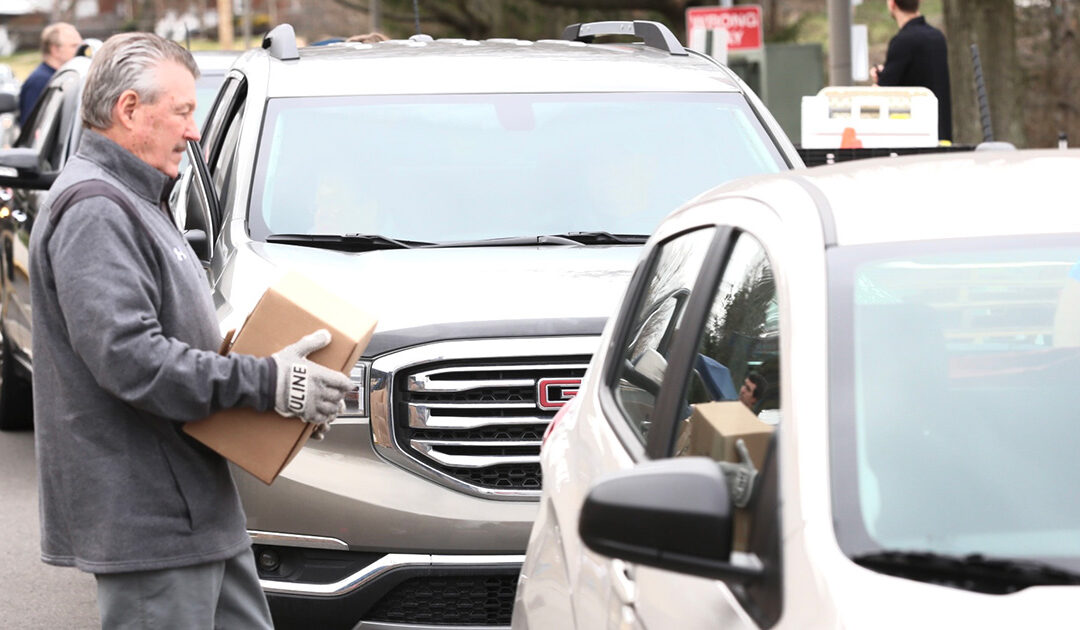
March 22, 2022
McKeesport, March 22, 2022 – State Senator Jim Brewster partnered with the Greater Pittsburgh Community Food Bank and U. S. Steel to host a drive-up food distribution event at the West Mifflin Area High School on Tuesday.
“Our country grows more food than any other nation, so it is unthinkable that anyone should go hungry,” Brewster said. “I am grateful for the opportunity to partner with these organizations to bring this vital need to area residents.”
The event took place between 4:30 p.m. and 6:00 p.m. in the West Mifflin Area High School parking lot, with volunteers loading boxes of food into vehicles and handing out information about state-related programs to help combat food insecurity.
Lisa Scales, President & CEO of Greater Pittsburgh Community Food Bank added, “Partnerships in the community are critical in making sure our neighbors have access to food when and where they need it. We’re seeing more and more families struggle with paying more at the gas pump and in the grocery store. Our entire network is here to make sure no family has to choose between paying their bills and feeding their loved ones.”
Senator Brewster’s office helped to register over 250 vehicles to drive up and receive a box of food, which included frozen ground beef, chicken breast, and ham steak, along with a non-perishable box of food and a box of produce.
“U. S. Steel and our employees are pleased to be working with Senator Jim Brewster and the Greater Pittsburgh Community Food Bank to support the Mon Valley communities where we live and work,” said Don German, Plant Manager, U. S. Steel Irvin Plant. “We hope these boxes help our neighbors, and we thank Senator Brewster for his years of leadership and support in the Mon Valley.”
With the help of supporters and partners, the Greater Pittsburgh Community Food Bank distributed nearly 45 million meals in Southwestern Pennsylvania from July, 2020 through June, 2021. However, there are more than 343,000 people in the Food Bank’s service area who experience food insecurity, according to a study conducted by Feeding America’s Map the Meal Gap. That means 1 in 7 of our neighbors are living with food insecurity. Individuals who want to help, can donate or volunteer by visiting www.pittsburghfoodbank.org.
Senator Brewster added that anyone unable to attend on Tuesday can find more food distribution events in the region, as well as additional information about food assistance programs by visiting www.pittsburghfoodbank.org or by calling 412-460-3663 ext. 655.

December 23, 2020
McKeesport – December 23, 2020 – Senator Jim Brewster today announced more than $6 million in state grants that will go to projects in the 45th senatorial district.
“I was happy to advocate for these important projects, and I am excited to see them come to fruition thanks to this investment from the state,” said Senator Brewster. “Each of the projects funded today will bolster our region’s economy.”
The funding comes from the Redevelopment Assistance Capital Program (RACP), a Commonwealth grant program administered by the Office of the Budget for the acquisition and construction of regional economic, cultural, civic, recreational, and historical improvement projects.
One of the projects funded will be the expansion of PurePenn in McKeesport. The medical marijuana manufacturer will receive $2,000,000 to conduct an interior build-out which will include mechanical, electrical, fire protection, and other interior building components.
“This investment in McKeesport has been a job creator and a real contributor to the regional economy”, said Brewster. “I am looking forward to what comes for the area from this substantial funding.”
Also, UPMC St. Margaret’s Family Health Center in New Kensington will receive $1,250,000 for a new clinical space to accommodate more patients, provide room for team and group meetings, and offer swing spaces for outside social service agencies.
The Greater Pittsburgh Community Food Bank will receive $1,000,000 to improve overall efficiency and support distribution of more fresh produce.
In addition to these investments, the Braddock Carnegie Library Association is slated to receive $1,000,000 to implement the first comprehensive building renovation and preservation plan in the 132-year history of the Braddock Carnegie Library.
And finally, the Former Westinghouse HQ/Pittsburgh Supercomputing Center in Monroeville will receive $1,000,000 as it moves forward with efforts to provide university, government and industrial researchers with access to systems for high-performance computing, communications, and data storage.

September 8, 2020
McKeesport – Sept. 8, 2020 – State Sen. Jim Brewster’s (D-Allegheny/Westmoreland) effort to safely increase indoor and outdoor seating for bars and restaurants moved forward today as the Senate Law and Justice Committee approved legislation to expand capacity.
Brewster supported a bill (House Bill 2513) to increase indoor occupancy and offered a revised plan to expand seating for outdoor dining. Brewster’s amendment to increase capacity for bars passed unanimously.
Earlier this year, he wrote a letter to the governor seeking state regulatory permission for bars and restaurants to safely reopen with additional seating.
“Since the COVID-19 pandemic struck, I have been trying to make sure that our economy can reopen safely, including increasing capacity for bars and restaurants,” Brewster said. “The committee action today to increase capacity, in addition the announcement by the governor to ease restrictions, will help restaurants, bars and the hospitality industry.
Restaurants have been hit particularly hard by seating restrictions and have sought ways to safely reopen with expanded capacity.
Just prior to the committee’s action, the governor announced that he was easing restrictions on restaurants. The governor said that restaurants can increase their indoor occupancy to 50 percent beginning Sept. 21.
Brewster, who serves as Democratic chair of the Law and Justice Committee, has been a strong and forceful advocate for protecting workers and patrons while reopening the economy in the face of the pandemic.
In July, along with his colleague, Sen. Pam Iovino (D-Allegheny/Washington), Brewster offered plan to use $100 million in federal pandemic recovery funds to help restaurants and bars impacted by forced closures.
Earlier this year, the lawmaker outlined a six-point economic stimulus plan to help workers and small businesses and he detailed a safe reopening strategy for area businesses that protected workers and consumers.

September 4, 2020
McKeesport – Sept. 4, 2020 – Decisions on whether to restart interscholastic fall sports should be left to local school district officials, state Sen. Jim Brewster (D-Allegheny/Westmoreland) said today following his vote in support a bill that would leave it to school boards to decide.
“The legislation makes it clear that local school boards will make that decision — as long as health and safety protocols are in place,” Brewster said.
Brewster voted for House Bill 2787 in the Senate Education Committee on Friday for the second time following a reconsideration of Thursday’s vote. The committee voted 10 to 1 in favor of the bill, which will now be reported to the full Senate.
“The legislation enjoys strong and wide support and should be quickly passed by the full Senate,” Brewster said. “We need to give local officials discretion to make decisions once safety protections are established.”
Brewster serves on the statewide School Safety and Security Committee. In June, the committee recommended a framework to distribute more than $150 million in federal pandemic relief funds to school districts across the state. The funding was earmarked to help schools deal with COVID-19 expenses.
“We have distributed funding to local schools to help defray costs, but more needs to be done,” Brewster said. “These funds and the approval of bills to give local school districts discretion on reopening strategies and school sports are key aspects of the recovery.”
Brewster said school directors get input each day from parents, school administrators and others on reopening school sports and are well positioned to make that decision.
The McKeesport lawmaker has been recognized as a leader on boosting the economy and safely reopening in the wake of the coronavirus pandemic.
In March, Brewster offered a six-point economic stimulus plan to quickly regain jobs and spur a quick recovery from COVID-19. In April, he detailed a health and safety strategy to ensure that a rapid, but safe reopening, featuring more testing and protections for workers.

May 28, 2020
Harrisburg – May 28, 2020 – Sen. Jim Brewster (D-Allegheny/Westmoreland) said today that the Senate has passed legislation (House Bill 1210) to drive out nearly $215 million to help school districts pay for costs associated with protecting children, cleaning buildings and modifying structures in response to the COVID-19 pandemic.
“This is a necessary infusion of cash to help school districts protect children and adjust the footprint of facilities in response to the COVID-19 pandemic,” Brewster said. “School districts need additional funds to clean buildings, make social distancing modifications and purchase necessary equipment.”
Brewster said that nearly $200 million will be earmarked for school entities. Each school district will receive at least $120,000, plus the districts will receive additional funds based on average daily enrollment of school districts — an additional $114 million will be available for distribution on a pro rata basis. Career and technical schools, intermediate units and other schools will receive an allocation of $90,000.
The COVID-19 Disaster Emergency School Health and Safety Grants were previously known as the School Safety and Security Grant Program. Brewster has served as a member of the School Safety and Security Committee distributing grants to school districts since its inception.
The funding provided to school districts can be used for:
- Purchasing of cleaning and sanitizing products that meet Center for Disease Control (CDC) or Department of Health criteria;
- Training and professional development of staff on sanitation and minimizing the spread of infectious disease;
- Purchase of equipment, including personal protective equipment, thermometers, infrared cameras and other necessary items;
- Modification of existing areas to effectuate appropriate social distancing to ensure the health and safety of students and staff;
- Providing mental health services and supports, including trauma-informed education programs for students impacted by the COVID-19 disaster declaration;
- Purchasing education technology for distance learning to ensure the continuity of education; and,
- Other health and safety programs, items or services necessary to address the COVID-19 disaster emergency.
Brewster said that $150 million of the total funds to be distributed will come from federal CARES Act funding. He said that in addition to the distribution to school districts, another $7.5 million will be used for community violence prevention grants. There will also be $7.5 million available for intermediate units to address COVID-19 issues.
The bill returns to the state House for its consideration.
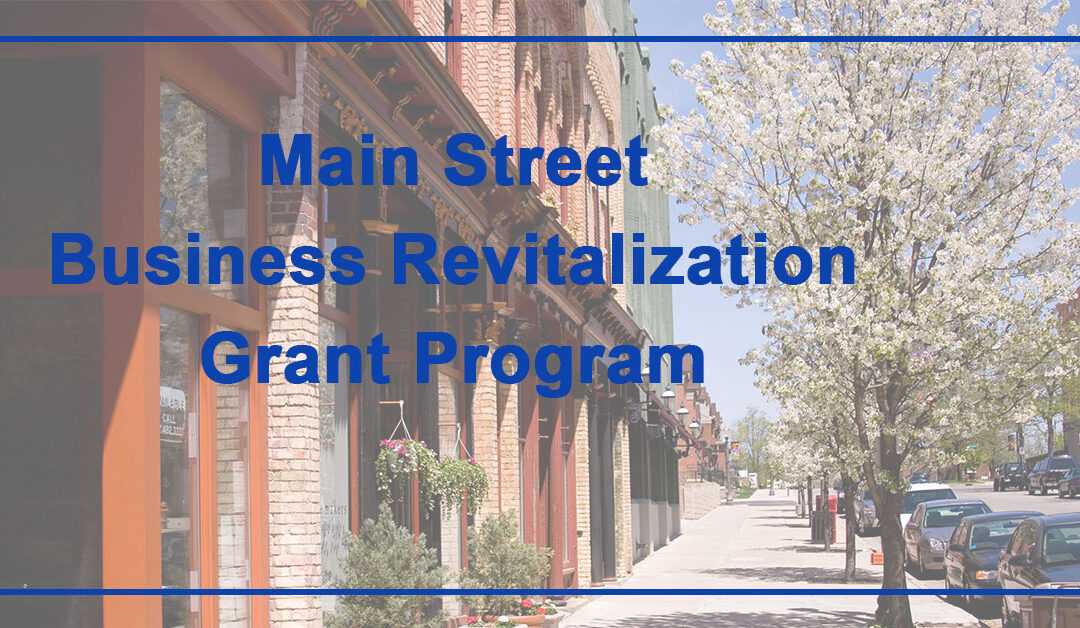
May 22, 2020
Senators Jay Costa, Vince Hughes, John Blake, Jim Brewster and Pam Iovino today called for $550 million of funds allocated to Pennsylvania through the federal CARES act to be used for a program they are calling the Main Street Business Revitalization Initiative, which will issue grants.
“This pandemic has exposed the fragile ecosystem and slim margins that small businesses and their workers function within every single day,” Costa said. “As Pennsylvania begins to recover both economically and physically from the COVID-19 pandemic, we must make sure that our business owners have the resources they need. We must seek a just recovery from this pandemic.”
The Senators are calling for $425 million to go to traditional main street businesses, and a separate $125 million to be allocated to historically disadvantaged businesses.
Pennsylvania has received $4 billion from the federal government that must be spent or allocated by December 31, 2020. The Senate Democrats have proposed a robust plan for those funds called PA CARES (more info at pasenate.com/pacares)
“These main street businesses did not cause this pandemic, but they are feeling its worst financial effects,” Sen. Hughes said. “Our plan gets these small businesses the financial assistance they deserve. Money has been sitting in Pennsylvania’s account for six weeks, which is money intended, by the direction of the federal government, to assist small businesses, and that money needs to go out immediately. The question is: Why are we waiting? The answer is: We can wait no longer. Small mom-and-pop, main street, and neighborhood businesses — especially those businesses in historically disadvantaged communities who have born the financial brunt of this pandemic — need this help. Our plan gets it to them immediately. All grants and no loans. They need this cash now and our plan gets it to them now. From the barbershop in North Philadelphia and to the nail salon in Pittsburgh, and from the pizza shop in Scranton and to the auto body shop in Erie; our plan sees their pain, especially those in historically disadvantaged communities, and responds to it. Real money in real time.”
This initiative will be run by Community Development Financial Institutions (CDFIs) who are committed to providing flexible loans, debt relief and business technical assistance to support the recovery and sustainability of Pennsylvania businesses. CDFIs are known to be “first responders” during periods of economic turmoil because of their keen knowledge of and connection to the communities they serve. More importantly, they have a demonstrated capacity to focus on the critical needs of small businesses.
The Main Street Business Revitalization Initiative is a retroactive way to address the serious challenges of the main street small business community caused by the COVID-19 and the devastating but necessary closures ordered in Pennsylvania to protect public health.
“Our small businesses – restaurants, barbershops, cafes, bakeries, boutiques – are the heartbeat of our communities and the backbone of our economy,” said Senator John Blake. “Throughout the pandemic, their bills have continued to mount despite limited or no sales at all, insufficient income and, to-date, inadequate support and funding from the federal stimulus package. Our proposal will provide $550 million in grants to Main Street small business owners throughout the state using Pennsylvania’s share of the federal CARES Act COVID-19 relief package. It will allow small business owners to pay health care premiums, insurance policy premiums, rent, loan payments, real estate tax payments, as well as covering some of the costs that must be incurred to ensure the safety of workers and customers as businesses reopen.”
Eligible businesses will include barbers, salons, restaurants, bars, and taverns, retailers, coffee shops, neighborhood hardware stores, garden shops, realtors, childcare facilities and the numerous other small businesses who have suffered economically during this challenging time.
Previous business assistance programs have inadvertently disadvantaged many main street businesses who were unprepared to tap into the network of assistance. Through the assistance of CDFIs, main street businesses will have access to job protection and initiatives through financial institutions they are comfortable with.
“To spur a vigorous economic rebound, state and federal resources must be deployed effectively including using federal CARES dollars to help small businesses that have been severely impacted by the pandemic,” Brewster said. “Driving funds out now to help businesses get their operations underway, cover costs, and navigate the regulatory environment in the immediate aftermath of a government-mandated closure is an excellent approach.
“The stimulus plan that I offered earlier this year to re-ignite business activity and speed the economic recovery once the pandemic’s health risk was addressed included elements to aid small business. Pushing financial assistance while promoting safety and security for workers and consumers is the way to reengage our economy in a meaningful way.”
“Small businesses represent nearly half of the private sector workforce in Pennsylvania – 2.5 million jobs. They are the job creators in our communities, yet they were glaringly overlooked by federal business relief programs,” said Senator Iovino. “While small business owners are making difficult decisions about how long they can hang on, they need to know that a lifeline will be available to them. We do not want to see any of these businesses fail, and the $550 million Main Street Business Revitalization Initiative is exactly the kind of lifeline that these economic drivers need.”
As many Pennsylvania counties are now in the Yellow phase of reopening and on their way to Green phase, businesses cannot be expected to open their doors and have all the issues of these past months disappear.
Local businesses, and the workers that they employee, need the legislature to act and disperse funds that will aid in the lost revenue and assist in building back up the business back bones of our community.
The Pennsylvania Senate Democrats have released their PA CARES plan with initiatives that include assistance for the business community, housing assistance programs, student debt relief, veterans’ assistance, utility assistance, and food bank support. Read all proposals at pasenate.com/pacares.
###

April 2, 2020
McKeesport – April 2, 2020 – State Sen. Jim Brewster (D-Allegheny/Westmoreland) said today that the new federal stimulus program passed in response to the pandemic allows volunteer fire companies to apply for the Small Business Administration’s Economic Injury Disaster Loans (EIDL) and Paycheck Protection Loans (PPP).
“The federal stimulus act enables qualifying volunteer fire companies to apply for EIDL and PPP loans with funds that will be made available quickly,” Brewster said.
EIDL loans can provide up to $2 million in working capital with emergency grants immediately available. An advance of $10,000 for volunteer fire companies organized as IRC 501 (c) (3) of IRC 501 (c) 4 can be accessed within three days of application. Organizations applying for funding will not be required to repay the funds, even if a loan application is ultimately rejected.
Brewster said that qualifying volunteer organizations that pay firefighters can also access federal funds through the PPP. Under this program, loans will be forgiven if employees are kept on the payroll for eight weeks and the funds are used for payroll, rent, mortgage interest or utilities.
“The International Association of Fire Chiefs has provided guidance for departments to seek federal stimulus funds to help cover costs,” Brewster said. “I encourage all volunteer fire departments to examine these programs in depth and seek federal help during this very difficult time.”
Brewster said that more information on the program can be found at https://www.iafc.org/blogs/blog/iafc/2020/04/02/volunteer-departments-eligible-for-cares-act-loan-programs

March 23, 2020
Senator says state needs to fill gaps in federal aid
McKeesport – March 23, 2020 – As efforts to curb the spread of COVID-19 continues and federal economic plans come into view, a state stimulus effort focused on workers and small business is critical to fill gaps in national recovery efforts, state Sen. Jim Brewster (D-Allegheny/Westmoreland) said today.
In a detailed letter to Gov. Tom Wolf, Brewster laid out a 6-point plan to bolster economic recovery efforts and speed help to workers and small businesses once health risks subside.
“The federal government is capable of marshalling resources to deliver short-term economic relief for those impacted by the pandemic; and Congress is moving toward adopting a robust plan to kick-start the economy once the COVID-19 threat is contained,” Brewster said. “Without question, there will be gaps in the federal effort and that is where the state has a role to play.
“Infusing cash into the economy through grants to small business, bolstering unemployment compensation, accelerating public works projects, reducing business tax liability over the long-term, expanding bonding capacity and coordinating the response through a one-stop response office are ways the state can step in and speed relief.”
Brewster said his 6-point plan would buttress an expected a massive federal relief package now winding its way through Congress.
Details of the plan include:
- Unemployment Compensation (UC) Booster: To help workers weather the economic crisis, a state-augmented booster in the form of direct payments to workers who lost their jobs in the pandemic should be an integral part of the economic recovery plan. The UC booster would augment and supplement evolving federal efforts to help the unemployed.
- Bridge Grants: Create short-term bridge grants to get business up and running as soon as possible and cover near-term expenses. Once the immediate financial crisis period is over, provide additional assistance to qualifying small business can be in the form of zero-interest or very low-interest loans. The three-step approach would give businesses breathing room and provide a foundation for recovery.
- Expand Bonding Capacity: The funding to small businesses would come from expanding or repurposing Pennsylvania’s bonding capacity with new financing through either the Commonwealth Financing Authority or other bonding authority with funds immediately available for grants. Plus, sweep unencumbered General Fund and special fund accounts to finance recovery efforts.
- Special Tax Provisions: Expand Net Loss Carryforward: Help small businesses deal with long- term impacts, expand net loss carryforward program to cover taxes and help reduce future pandemic-related tax liabilities.
- Accelerate Infrastructure Improvement Projects: Pushing state funds out now and opening financial levers to fund water, sewer, transportation and community improvement projects would not only generate work directly in construction but also require supply chains to ramp up hiring to fill commodity requirements.
- Pandemic Recovery Czar: Coordinate the response and the distribution of funding specifically related to the pandemic through a single contact point in state government — a “recovery czar.” A recovery czar was effectively utilized by the federal government during the financial crisis a decade ago and has been a successful model for coordination of government services during past crises.
“My goal in detailing the plan is to begin identifying state resources and capabilities so that we can immediately respond to the economic crisis caused by the pandemic,” Brewster said.
The senator said he expects his Senate colleagues, House legislators and the governor to have other ideas about how to address the economic crisis. He said detailing his plan would help promote discussions of a robust state effort to reinforce federal stimulus plans.
-30-
Editor’s note: Sen. Brewster’s letter to Gov. Tom Wolf follows.
March 23, 2020
Honorable Tom Wolf, Governor
Commonwealth of Pennsylvania
225 Main Capitol
Harrisburg, PA 17025
Dear Governor Wolf:
The impact of the COVID-19 pandemic has had life-altering implications for citizens across Pennsylvania, throughout the United States and around the world. The steps your administration has taken to protect the health, safety and security of Pennsylvanians will save lives and stop the spread of the disease. Addressing the health care crisis is the priority now.
Pennsylvanians have heeded the call, and most are practicing social distancing. In addition, swaths of businesses have now been temporarily closed to aid mitigation efforts. Once the imminent health threat is addressed and Pennsylvanians are permitted to return to work and resume their lives, we need to look at the next steps that can be taken to restart economic activity as quickly as possible.
Economic experts generally agree that the way for our nation and state to bounce back quickly is by infusing cash back into the economy. I wholeheartedly endorse any effort to get dollars into hands of workers, small businesses and all consumers. This is the best way to jump-start our economic recovery from the pandemic.
While Pennsylvania does not have the financial capacity of the federal government to present massive aid, we can provide substantial gap funding and augment national recovery efforts. The state’s effort needs to be broad-based and focused on workers, families and small business. We must be creative and willing to explore innovations to existing programs while being flexible so that economic needs can be met.
Our current unemployment compensation (UC) program will provide a brief, but insufficient respite for workers. While UC will help and the now-evolving federal stimulus efforts will likely bolster our UC program, it will not be enough to provide long-term family-sustaining compensation.
Extreme pressure will be placed on the system from the tens of thousands of displaced workers. Given the strain on the system, we must explore additional ideas to respond to needs of working men and women. To that end, we should plan on providing a state-funded booster, or UC kicker to the federal effort. Adding a state booster –perhaps $100 to $200 per month for pandemic-related job loss — would help workers get some relief now.
Another critical way to help workers — once the health risk abates– is through a robust assistance package for small businesses and those essential consumer businesses that have remained at work but have lost huge amounts of revenue during the shut-down. This includes dine-in restaurants that have become drive-thru services, media companies reliant on advertising from forced-closed business establishments and others that have remained open yet have absorbed losses from the pandemic. We cannot forget them in the recovery.
Lastly, we can put people back to work directly, and quickly, if we accelerate state grants and loans for infrastructure improvements and push out state money for water and sewer grants and loans, transportation projects and community improvements that are currently in the pipeline. Not only will this create jobs in construction, it will require supply chains to ramp up production and hire workers to fill needs.
This broad expansion would be funded in the near term by an aggressive expansion of bonding and use of all state financial levers to open doors to capital markets. In addition, we need to sweep unused and unencumbered state dollars in the General Fund and special accounts to speed the infusion of money and boost immediate recovery.
In an outline below, I’ve identified several elements of a state-based plan that would augment the federal assistance package that is now being crafted. These thoughts could be combined with other proposals you and your staff are gathering as we manage the recovery from the COVID-19 pandemic.
The plan includes:
- Unemployment Compensation (UC) Booster: To help workers weather the economic crisis, a state-augmented booster in the form of direct payments to workers who lost their jobs in the pandemic should be an integral part of the economic recovery plan. The UC booster would augment and supplement now-evolving federal efforts to help the unemployed.
- Bridge Grants: We need to provide short-term bridge grants to get business up and running as soon as possible and cover near-term expenses. Then, once the immediate financial crisis period is over, further assistance to qualifying small business can be in the form of zero-interest or very low-interest loans. This 3-step approach would give businesses breathing room and provide a foundation for recovery.
- Expand Bonding Capacity: The funding provided to small business should come from an expansion of our bonding capacity with new financing provided through either the Commonwealth Financing Authority or other bonding authority with funds immediately available for grants. Plus, we should transfer unencumbered General Fund and special fund accounts to finance recovery efforts.
- Special Tax Provisions: Expand Net Loss Carryforward: To help small businesses deal with long term impacts, we should expand the net loss carryforward program to cover taxes and help reduce future pandemic-related tax liabilities. Keeping business in business will spur re-hiring and be an important feature of our recovery.
- Accelerate Infrastructure Improvement Projects: Pushing state funds out now and opening financial levers to fund water, sewer, transportation and community improvement projects would not only generate work directly in construction but also require supply chains to ramp up hiring to fill commodity requirements.
- Business Recovery Czar: We should coordinate the response and the distribution of funding specifically related to the pandemic through a single contact point in state government — a “business recovery czar.” A recovery czar was effectively utilized by the federal government during the financial crisis a decade ago and has been a successful model for coordination of government services during past crises.
I realize that there will be many concepts and proposals offered to address economic needs of workers and businesses. The items noted in this letter represent one way to address the needs of working men and women and small business.
Please contact me if you or your staff are interested in further discussion.
Sincerely,
Jim Brewster
State Senator

























